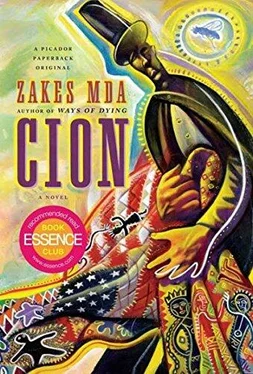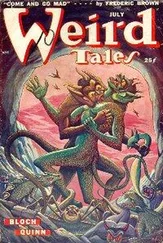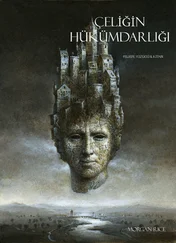“We all know that one, Mr. Quigley,” says Ruth. “The warning of the Cherokee elders and all.” Then to me: “Mr. Quigley likes the old stories. He told them to the kids when they was little. Maybe if he told them Bible stories instead they wouldn’t be the way they are.”
“A prophecy,” says Mahlon as if to himself. “It says them folks were the walking dead ’cause they didn’t have no connection to the memories of their ancestors.”
“Ain’t no true prophecy but the one in the Bible, Mr. Quigley,” says Ruth respectfully.
“Our roots are Shawnee,” says Obed. “He should tell Shawnee stories, not Cherokee. He should talk about Our Grandmother.”
“You don’t know nothing about it, boy. We ain’t no Shawnees. And them Shawnees were crazy anyways. How can God be a woman?”
Obed is about to defend his Shawneeness when I butt in: “Please…let’s talk about Orpah.”
“She’s gotta settle down with Nathan and stop being silly,” says Ruth.
I doubt if Nathan would be the remedy in this case, I say quite boldly. Her creative spirit should be set free to go wherever it wants to go. She is a grown woman after all, and I don’t understand why she should let herself be captive to a situation she feels does not allow her the freedom to create. Ruth is taken aback because I have never attempted to state views that contradict hers before.
I love tradition too, I continue, but sometimes people want to create their own traditions. Just as I did with professional mourning. It is not part of the culture of any of the people in my country. I even thought that I had invented it. I only discovered later that some faraway lands elsewhere do or did have this tradition. That’s what set me on the road in search of the tradition of professional mourning. And in search of mourning itself. Let Orpah be the founder of her own tradition. Or participate in other traditions that have been founded by others. People out there are already doing wonderful things with quilts. People out there have long transformed the quilt from being a mere bedcovering with geometric patterns that, granted, have cultural significance, into works of modern art that make statements about their world today. Orpah has something to say to the world, let her work give her an unhampered voice.
Ruth is stunned. She glares at me. It is the glare that usually makes everyone freeze or jump into action, depending on the situation, and has been christened “the evil eye” by her children. But I do not flinch. Mahlon looks at me and at Ruth. And then back at me. His smile has faded a bit and his eyes show some vague traces of anxiety. Obed looks at me and at Ruth. And then back at me. He shakes his head and says under his breath: “She ain’t gonna like you after this, man. She ain’t gonna like you no more.”
“This ain’t Africa, Mr. Professional Mourner,” Ruth finally says, trying to muster as much sarcasm in her tone as she can. “We got our way of doing things here.”
This shuts me up. She orders Obed to clear the dishes, but while he tries to do so she stands up and clears the table herself. She always does that. Gives her children chores to do, but ends up doing them herself, not because they have shirked but because she thinks they are not doing a proper job of it.
I have heard her ask Obed to do the laundry. But even before he gets to do it Ruth takes over and does it herself with her rickety washing machine in the small room adjacent to the kitchen. She then wakes up early in the morning to hang it on the line. The clothes, especially the sheets, become rock solid even before she has properly hung them. She dips her hands in a bucket of hot water and then hangs another garment, while complaining that her children are lazy and want her to do all the work. The winter sun dries the clothes by the end of the day and they acquire a beautiful fresh winter scent.
With these dishes for instance, she takes over because she says Obed is doing the job half-heartedly. I also stand up to assist her, and in the kitchen we decide that we might as well wash the dishes rather than leave them there for another time. I wash, she dries. Not a word passes between us, which makes me very nervous. I miss the Ruth who is always ready with a smile and the stories of how her “race of people” came into being, and how they are the future of the world, and of the greatness of her favorite politician of all times, who is the chosen one since he gets his messages from God. This smarting Ruth is not the Ruth whose company I would like to keep. As soon as I finish washing the last plate I dash out to the living room to join Obed and Mahlon.
They are staring at the blank screen of the television, a ritual they have been following since the set broke down a few days ago. We have been waiting for Nathan to come and fix it — another feather in his cap since he is handy at fixing gadgets and Obed is not. Ruth returns from the kitchen and we all silently watch the television. For the past few days it has been painful to watch the withdrawal symptoms of the family, especially Ruth and Obed. Orpah, of course, could not have cared less since she has her drawings and her sitar in her room. I don’t know if Mahlon was bothered at all since his expression never changes. But Ruth and Obed! They became irritable and cantankerous. But now they are getting used to the absence of television and are waiting patiently for Nathan’s return from construction sites in neighboring counties.
Television is the family’s lifeblood. The family interacts with the rest of America through television. They partake of the American dream through the lives of the celebrities whose wealth, love affairs, divorces and pregnancies are followed faithfully. When they comment on them it is as though they know them personally. In this way they are no different from third world people who have never set foot on American soil yet live on a daily diet of these programs and American food aid. The Quigleys depend for their survival on food rations from the Kilvert Community Center. They “shop” for all their clothes at the Center. Since my arrival I contribute toward the groceries. And I pay for room and board. Which all goes a long way toward giving our dinner table some variety.
But of course I am digressing now. We are watching the blank screen. Silent. Smiling smileless smiles. Moping. Smarting. Even Orpah’s sitar is silent. Perhaps she is creating replacements for the designs that have been destroyed today.
The absence of television doesn’t really bother me because even when it is blaring above any meaningful conversation it rarely ever gives me a picture of what is happening in the world. America is kept ignorant of the world; except of course of the places where the homeland’s troops are actively involved. Even in that case they only know what it is in the national interest to know, for their free and independent media are patriotic and will therefore not give all sides of the story. This last observation may appear commonplace to most American readers. They may even think it lowers the tone of my story. But it will certainly amaze those who are following my story from South Africa; they think that the media here are the freest ever and that journalists can report on anything without fear of being labeled unpatriotic.
Anyway, Americans can afford to be ignorant about the world because they don’t need the world. They are, after all, as their Commander-in-Chief once put it, God’s gift to humanity. Even Obed, who otherwise does not share Ruth’s faith in the Commander-in-Chief, believes that he is God’s gift to humanity. He has said as much whenever we disagree on something. He always resorts to invoking his Americanness as a way of convincing me of the rightness of his position.
After an uneasy silence on my part I break it. I apologize to Ruth for my indiscretions. I admit that her family matters are none of my business. Encouraged by the slight smile on her face I tell her how much I have admired her and her love of tradition. Her tradition of making food, for instance. Her face brightens and her smile broadens. I knew I would get her there. Food. I have become a scoundrel like Obed.
Читать дальше












